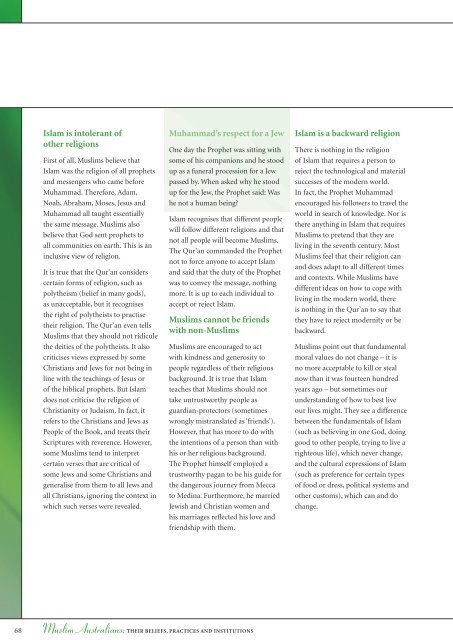Muslim Australians - Religion Cultural Diversity Resource Manual
http://www.islamicglobe.com
http://www.islamicglobe.com
You also want an ePaper? Increase the reach of your titles
YUMPU automatically turns print PDFs into web optimized ePapers that Google loves.
Islam is intolerant of<br />
other religions<br />
First of all, <strong>Muslim</strong>s believe that<br />
Islam was the religion of all prophets<br />
and messengers who came before<br />
Muhammad. Therefore, Adam,<br />
Noah, Abraham, Moses, Jesus and<br />
Muhammad all taught essentially<br />
the same message. <strong>Muslim</strong>s also<br />
believe that God sent prophets to<br />
all communities on earth. This is an<br />
inclusive view of religion.<br />
It is true that the Qur’an considers<br />
certain forms of religion, such as<br />
polytheism (belief in many gods),<br />
as unacceptable, but it recognises<br />
the right of polytheists to practise<br />
their religion. The Qur’an even tells<br />
<strong>Muslim</strong>s that they should not ridicule<br />
the deities of the polytheists. It also<br />
criticises views expressed by some<br />
Christians and Jews for not being in<br />
line with the teachings of Jesus or<br />
of the biblical prophets. But Islam<br />
does not criticise the religion of<br />
Christianity or Judaism. In fact, it<br />
refers to the Christians and Jews as<br />
People of the Book, and treats their<br />
Scriptures with reverence. However,<br />
some <strong>Muslim</strong>s tend to interpret<br />
certain verses that are critical of<br />
some Jews and some Christians and<br />
generalise from them to all Jews and<br />
all Christians, ignoring the context in<br />
which such verses were revealed.<br />
Muhammad’s respect for a Jew<br />
One day the Prophet was sitting with<br />
some of his companions and he stood<br />
up as a funeral procession for a Jew<br />
passed by. When asked why he stood<br />
up for the Jew, the Prophet said: Was<br />
he not a human being?<br />
Islam recognises that different people<br />
will follow different religions and that<br />
not all people will become <strong>Muslim</strong>s.<br />
The Qur’an commanded the Prophet<br />
not to force anyone to accept Islam<br />
and said that the duty of the Prophet<br />
was to convey the message, nothing<br />
more. It is up to each individual to<br />
accept or reject Islam.<br />
<strong>Muslim</strong>s cannot be friends<br />
with non-<strong>Muslim</strong>s<br />
<strong>Muslim</strong>s are encouraged to act<br />
with kindness and generosity to<br />
people regardless of their religious<br />
background. It is true that Islam<br />
teaches that <strong>Muslim</strong>s should not<br />
take untrustworthy people as<br />
guardian-protectors (sometimes<br />
wrongly mistranslated as ‘friends’).<br />
However, that has more to do with<br />
the intentions of a person than with<br />
his or her religious background.<br />
The Prophet himself employed a<br />
trustworthy pagan to be his guide for<br />
the dangerous journey from Mecca<br />
to Medina. Furthermore, he married<br />
Jewish and Christian women and<br />
his marriages reflected his love and<br />
friendship with them.<br />
Islam is a backward religion<br />
There is nothing in the religion<br />
of Islam that requires a person to<br />
reject the technological and material<br />
successes of the modern world.<br />
In fact, the Prophet Muhammad<br />
encouraged his followers to travel the<br />
world in search of knowledge. Nor is<br />
there anything in Islam that requires<br />
<strong>Muslim</strong>s to pretend that they are<br />
living in the seventh century. Most<br />
<strong>Muslim</strong>s feel that their religion can<br />
and does adapt to all different times<br />
and contexts. While <strong>Muslim</strong>s have<br />
different ideas on how to cope with<br />
living in the modern world, there<br />
is nothing in the Qur’an to say that<br />
they have to reject modernity or be<br />
backward.<br />
<strong>Muslim</strong>s point out that fundamental<br />
moral values do not change – it is<br />
no more acceptable to kill or steal<br />
now than it was fourteen hundred<br />
years ago – but sometimes our<br />
understanding of how to best live<br />
our lives might. They see a difference<br />
between the fundamentals of Islam<br />
(such as believing in one God, doing<br />
good to other people, trying to live a<br />
righteous life), which never change,<br />
and the cultural expressions of Islam<br />
(such as preference for certain types<br />
of food or dress, political systems and<br />
other customs), which can and do<br />
change.<br />
68 <strong>Muslim</strong> <strong>Australians</strong>:THEIR BELIEFS, PRACTICES AND INSTITUTIONS














